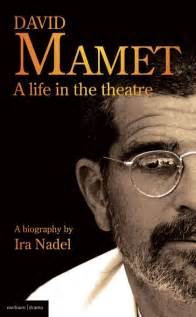| Good Crisp Study of an American Drama Great |
Theatre Writer Book |
| Ira Nadel “A Life in the Theatre” , Methuen Drama , November 26, 2013 |
 Theatr Clwyd mounted to acclaim a production of “Glengarry Glen Ross” this autumn. Critical plaudits were handed out equally for Max Jones' design, Kate Wasserberg's direction and the cast that included Christian Patterson and Simon Holland Roberts. The play holds an unusual place in American drama. It is set in an amoral bear-pit of commercial life that is utterly of the USA yet was premiered in London's Cottesloe. (As an aside, a school friend of mine saw that first run and, knowing little of company life, wondered whether my own workplace was filled with men shouting “leads, leads, give me the f***ing leads.”)
Theatr Clwyd mounted to acclaim a production of “Glengarry Glen Ross” this autumn. Critical plaudits were handed out equally for Max Jones' design, Kate Wasserberg's direction and the cast that included Christian Patterson and Simon Holland Roberts. The play holds an unusual place in American drama. It is set in an amoral bear-pit of commercial life that is utterly of the USA yet was premiered in London's Cottesloe. (As an aside, a school friend of mine saw that first run and, knowing little of company life, wondered whether my own workplace was filled with men shouting “leads, leads, give me the f***ing leads.”)Ira Nadel's book is five years old but Mamet's theatrical career has not changed in the interim. As Nadel reports he has been involved principally in film for a couple of decades. “A Life in the Theatre” is a workable 250 pages. A definitive biography of Bigsby-style weight may one day be forthcoming. For the moment, with a good index and notes, it does what it sets out to do economically and admirably. The title is taken from Mamet's two-hander play about two actors of different generations. In London its premiere was memorably played by Denholm Elliott and a young Samuel West. The life begins in Chicago and so far ends in Vermont. Nadel recounts the intense interest Mamet assumed in middle age in Judaism. He also records the early rapid ascent in theatre. At age 24 Mamet had done drama student, stage hand, lighting technician, actor, drama teacher, and was his own writer-director with a production in Chicago. Two years later he strides into Chicago's premier theatre, a manuscript under his arm and announces: “Something for your next season”. “I'll read it over the weekend” says the director. “You don't need to read it” says Mamet “Just do it.” The theatre reads it and does it. That was “American Buffalo”. Mamet has always done men, rougher than those of Neil Labute, less self-wondering than Miller. Richard Bean attributes his own drama career to his time in a Humberside industrial bakery. “I worked in so many parts of the city” Mamet is quoted here. “I sold real estate. I worked with carpets, I washed windows. I was a busboy and a waiter, I did retail sales, inventory. I worked in a truck factory, a canning factory.” In Vermont on a first visit he enjoys the hunting ethos. “Mamet writes well about guns” writes Nadel. Stretching the analogy somewhat he continues “finding their precision and detail reflect his own concern with exactness and accuracy.” It is not just the gun. “Guns and knives mark for Mamet an entry into the world of men, and he is unabashed in his pleasure in their company, especially those who shoot, hunt, gamble or box.” Mamet has written taut, almost terse books on how to act. His prescriptions work, at least for plays written by David Mamet. William B Macy, an early collaborator, describes the tough rehearsal method as “it takes it from being truthful to being very beautiful.” Mamet's aesthetics are captured by Nadel from different directions. Lindsey Crouse says “he's a very fine cutter. He knows what to cut and where.” Stanislavsky inspires: “generality is the enemy of all art. If your action is in general then everything you do on stage will be in general.” Mamet pithily compares the theatre of Chicago with New York City. In the windy city it is “Who wants what from whom? What happens if they don't get it? Why now?” Over in NYC it is “what does life mean?” Mamet summarises the difference between play and screenplay. In film “you're trying to show what the characters did and in a play they're trying to convey what they want. The only tool they have in a play is what they're trying to say. What might be wretched playwriting...may be good screenwriting.” In the film world Danny deVito who is director for “Hoffa” “comments “I got David to finish his sentences” Nadel quotes a Time magazine interview to the effect that Mamet knows “the cadences of loneliness and fear behind their bluntness and he also knows how to make bluntness very funny”. That was 1977 and says it well for this unique theatre presence. |
Reviewed by: Adam Somerset |
This review has been read 1389 times There are 34 other reviews of productions with this title in our database:
|
